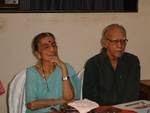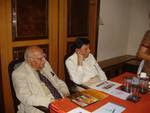





Mr Ram Jethmalani is a well known face amongst the legal community in India. Even though he is primarily known as only a criminal lawyer, he has appeared in many high profile cases.
I have known him nearly all my life as his daughter Shobha was a school class mate of mine and we continue to be good friends.
Ms Asha Chand,has a tremendous passion: To promote the Sindhi Language
Yesterday, the 29th of January I attended a meeting where we requested Mr Jethmalani to pursue our demand of a 24 hour Sindhi TV Channel from the Govt of India.
At the time of Partition we Sindhis did not receive any land to call our own, and yet in 60 years we Sindhis have struggled, not only survived but given back to Society in terms of Hospitals, Education Institutions...So in my mind we Sindhis deserve that much! What? A DD Sindhi 24 hour channel!
High quality TV Production could be the first step which can open more avenues of learning ones beautiful culture and language over a period of time!
I endorse what Asha Chand said:
We have three Mothers:
1) Who gave us birth
2) Matru Bhoomi (Our land)
3) Our Language
Do I even need to say that we must nurture them?
How?
Even putting a signature to a signature campaign might help. not to talk about sponsoring programmes on tv or speaking with personalities who may be able to help in the endeavour, or forwarding this note or blog url...
To watch a TV Interview that Asha Chand did of 'Yours Truly, Click on:
www.dalsabzi.com
For more Info
E Mail: info@sindhisangat.comwww.sindhisangat.com
www.sindhisangat.tv




